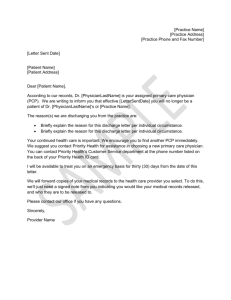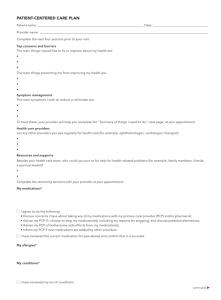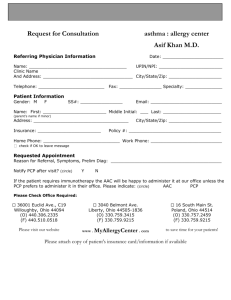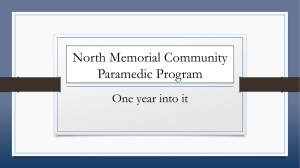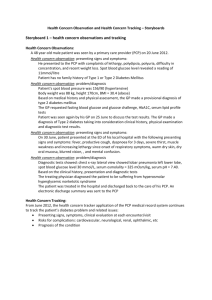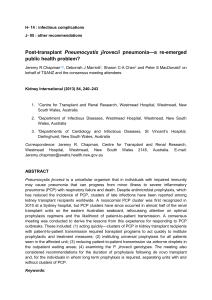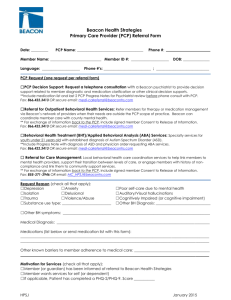In Memory of Alphe Casper Kenneth Libo In Memory of Bill Tynes
advertisement
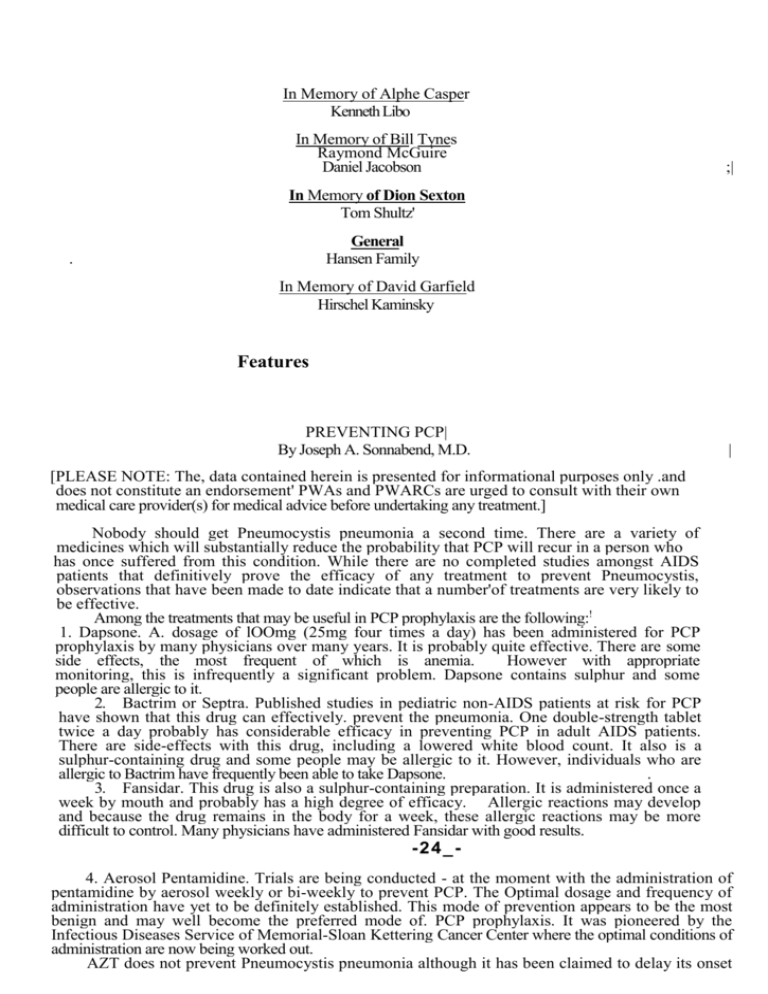
In Memory of Alphe Casper Kenneth Libo In Memory of Bill Tynes Raymond McGuire Daniel Jacobson ;| In Memory of Dion Sexton Tom Shultz' General Hansen Family . In Memory of David Garfield Hirschel Kaminsky Features PREVENTING PCP| By Joseph A. Sonnabend, M.D. | [PLEASE NOTE: The, data contained herein is presented for informational purposes only .and does not constitute an endorsement' PWAs and PWARCs are urged to consult with their own medical care provider(s) for medical advice before undertaking any treatment.] Nobody should get Pneumocystis pneumonia a second time. There are a variety of medicines which will substantially reduce the probability that PCP will recur in a person who has once suffered from this condition. While there are no completed studies amongst AIDS patients that definitively prove the efficacy of any treatment to prevent Pneumocystis, observations that have been made to date indicate that a number'of treatments are very likely to be effective. Among the treatments that may be useful in PCP prophylaxis are the following:! 1. Dapsone. A. dosage of lOOmg (25mg four times a day) has been administered for PCP prophylaxis by many physicians over many years. It is probably quite effective. There are some side effects, the most frequent of which is anemia. However with appropriate monitoring, this is infrequently a significant problem. Dapsone contains sulphur and some people are allergic to it. 2. Bactrim or Septra. Published studies in pediatric non-AIDS patients at risk for PCP have shown that this drug can effectively. prevent the pneumonia. One double-strength tablet twice a day probably has considerable efficacy in preventing PCP in adult AIDS patients. There are side-effects with this drug, including a lowered white blood count. It also is a sulphur-containing drug and some people may be allergic to it. However, individuals who are allergic to Bactrim have frequently been able to take Dapsone. . 3. Fansidar. This drug is also a sulphur-containing preparation. It is administered once a week by mouth and probably has a high degree of efficacy. Allergic reactions may develop and because the drug remains in the body for a week, these allergic reactions may be more difficult to control. Many physicians have administered Fansidar with good results. -24_4. Aerosol Pentamidine. Trials are being conducted - at the moment with the administration of pentamidine by aerosol weekly or bi-weekly to prevent PCP. The Optimal dosage and frequency of administration have yet to be definitely established. This mode of prevention appears to be the most benign and may well become the preferred mode of. PCP prophylaxis. It was pioneered by the Infectious Diseases Service of Memorial-Sloan Kettering Cancer Center where the optimal conditions of administration are now being worked out. AZT does not prevent Pneumocystis pneumonia although it has been claimed to delay its onset and reduce its severity. The AZT protocol has recently been changed to permit the use of Bactrim for PCP prophylaxis. Of course the issue of PCP prevention should have been addressed in the original study design and it is to be hoped that in future studies no one will be left unprotected from a recurrence of PCP. It is hard to be made to relinquish an intervention that will almost definitely prevent PCP in order to receive an experimental and toxic treatment whose beneficial effects cannot yet be known. The most common objection to the use of PCP prophylaxis has been that there is no established protocol at this time. However, anyone who has had PCP once has a realistic probability of experiencing a second episode. It seems unconscionable to wait for the unequivocal demonstration that a particular prophylactic method will guarantee freedom from recurrence. Considering the gravity of the pneumonia, it should be sufficient that a therapy has a very good chance of effectively preventing a recurrence. Of course, studies on the efficacy of the agents mentioned above must continue, however, even without the final results of such studies, prophylaxis should be offered. Physicians tend to respond to authoritative recommendations regarding the management of specific diseases. For example: the Public Health Service would represent such an authoritative voice. While no recommendations can be made in the absence of clear-cut data, suggestions may be certainly given while such data is being collected. Many physicians in New York City have been administering PCP prophylaxis for some years with good results. However, there are physicians in New York City whose practice is not to administer such prophylaxis. If this is true in New York City, it is likely that many more patients go without prophylaxis in smaller communities. It is surprising to us that studies on experimental treatments for AIDS, particularly in those who have had PCP, do not include measures for PCP prophylaxis since, as mentioned, such measures are available and likely to be effective. Aerosol pentamidine is probably the modality that is least likely to interact with, an experimental treatment and it is therefore of the greatest urgency that efficacy studies on this treatment be completed and published.. ' While individuals who have had one episode of PCP would benefit from' prophylaxis, people with other manifestations of AIDS who have not yet had PCP could also usefully receive PCP prophylaxis. However, precisely what criteria are used in determining whether or not ,an immuno-compromised individual should receive prophylaxis remain to be established. Studies designed to elucidate factors predictive of the development of PCP are urgently needed. If the modality used for prophylaxis is not significantly toxic, as may be the case for aerosol pentamidine, then the selection of patients to prophylax can be broader, as the potential benefit would clearly outweigh any possible harm. We urge you to discuss the issue of prophylaxis for PCP with your physician. -25-
